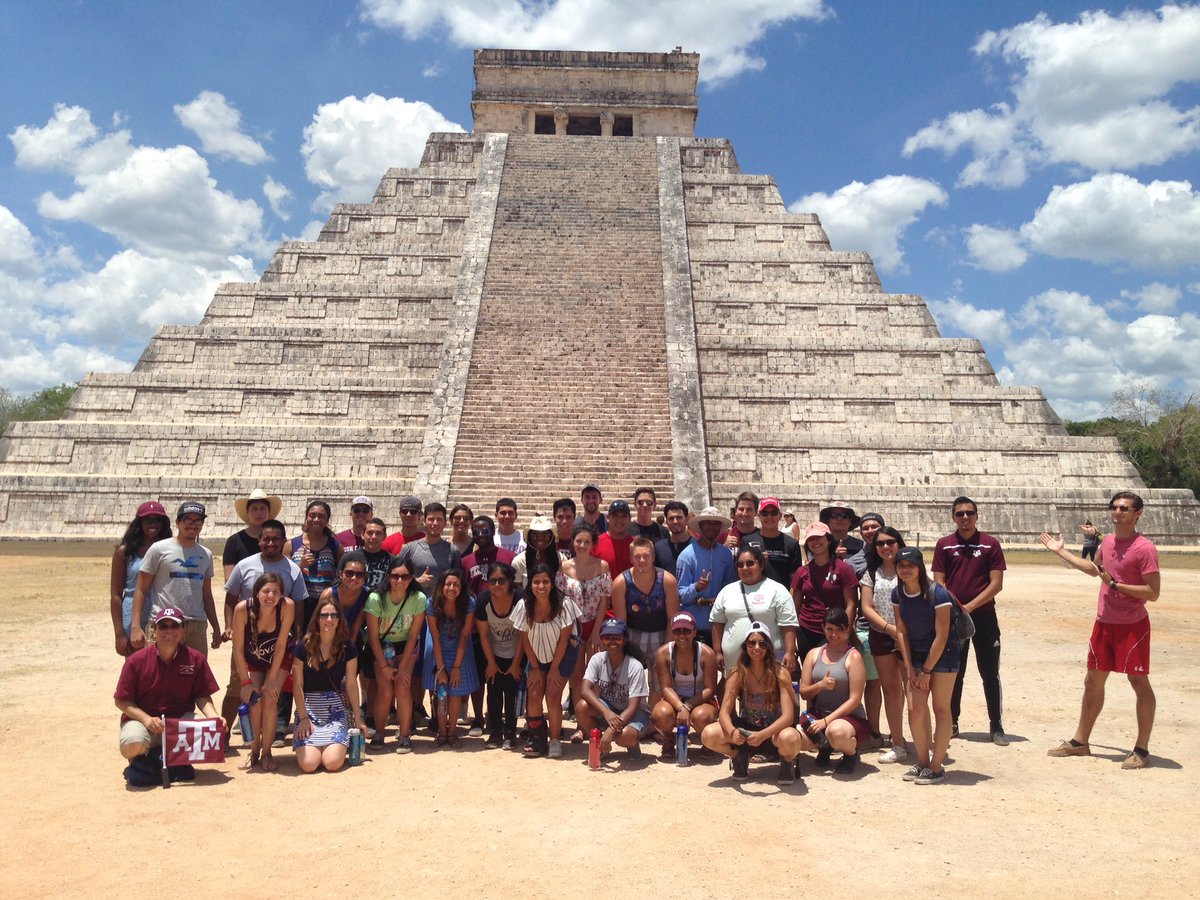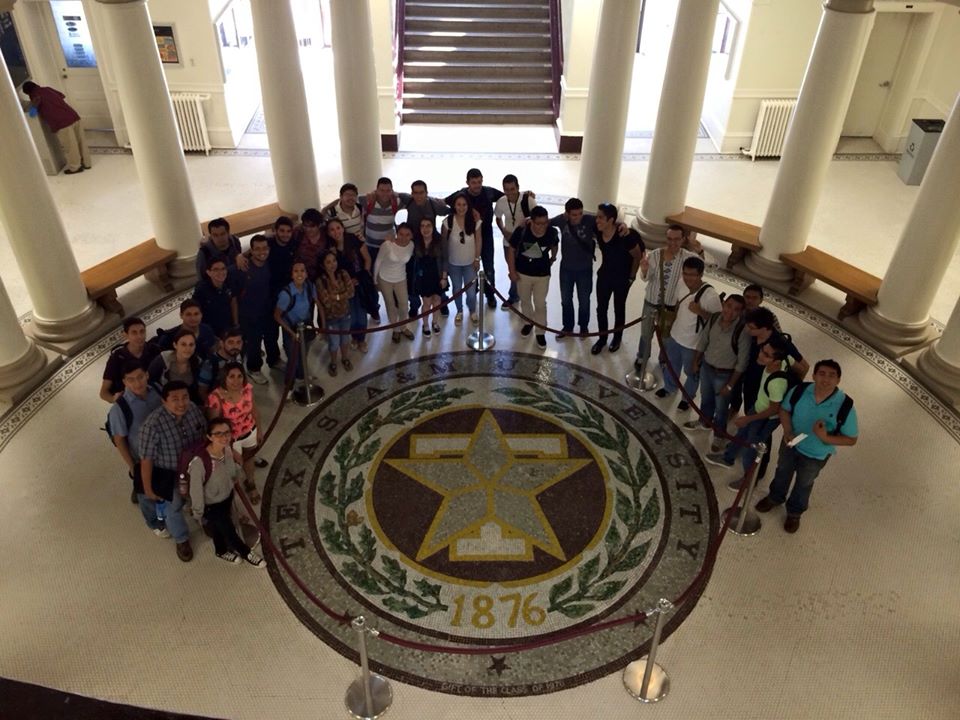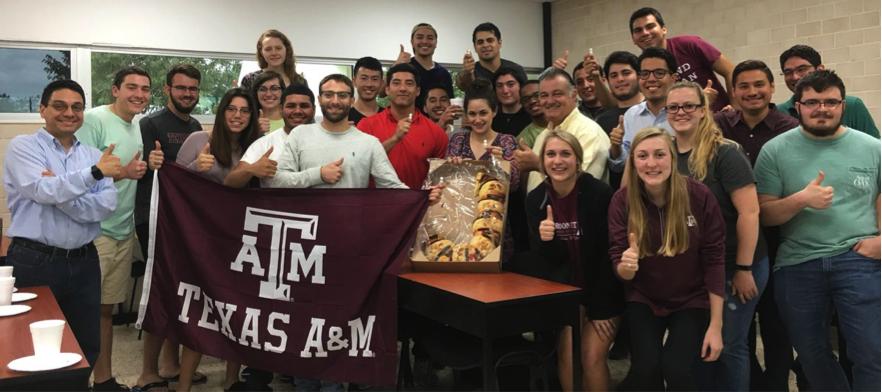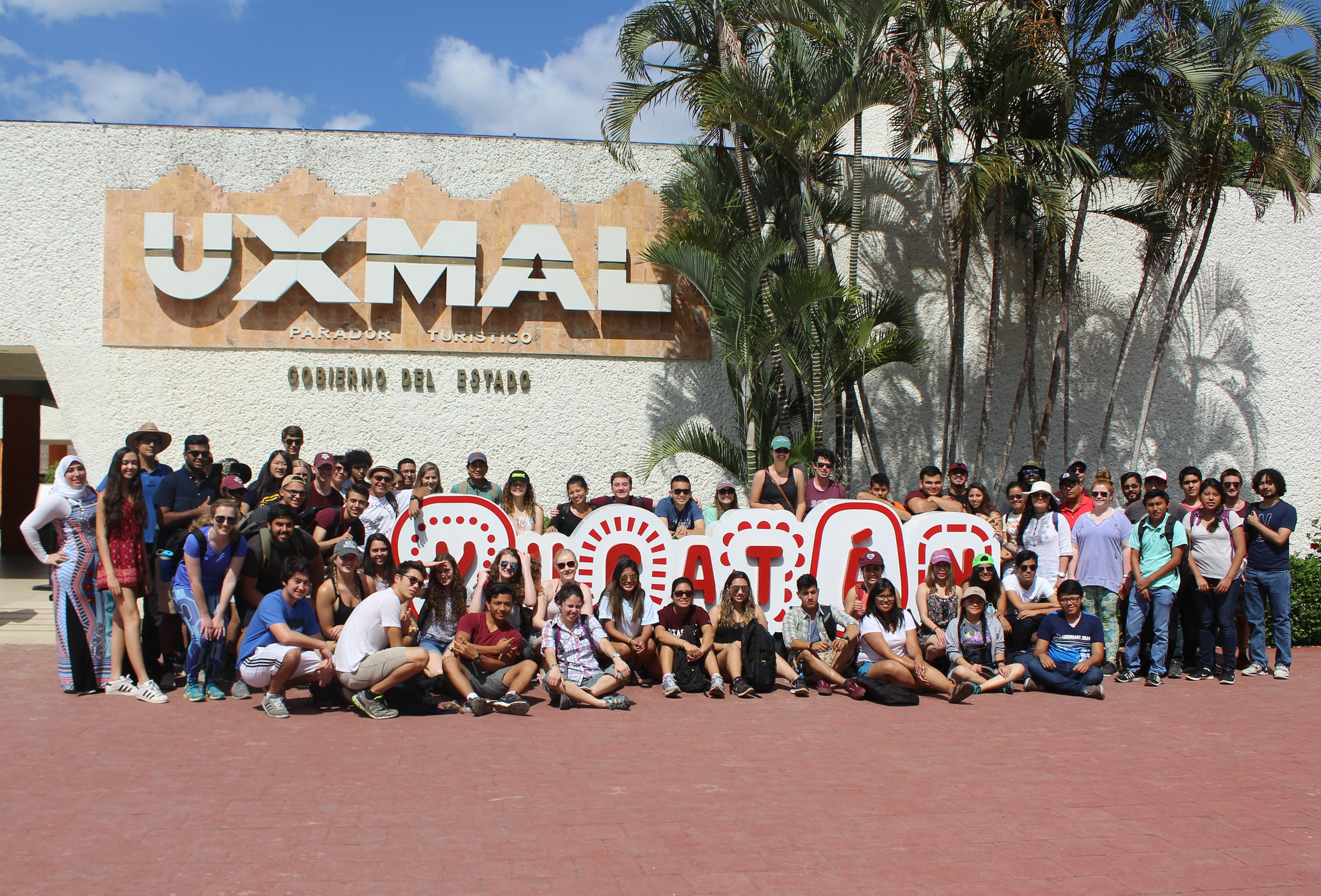The Engineering Learning Community Introduction to Research (ELCIR) is a research abroad program for “freshman first generation underrepresented” Regent Scholars. During spring, the students participate in “hands on” research workshops, visit research sites, and tour cultural areas in Yucatan to better understand the regional environment and generate proposals of solutions to problems that can benefit both states of Texas and Yucatan. Upon their return to TAMU, the students continue to work on their research proposal, meeting/talking with their faculty mentors (TAMU faculty members of the YIP), and participate in the ELCIR Online Learning Community. To compete the program, students present their research proposal in a poster session. Areas of research participation include:
- Chemical engineering
- Renewable energy
- Biotechnology
- Food safety
- Climate change
- Infrastructure Sustainability
- Among others
In 2015 the College of Engineering’s Engineering Global Programs and the Engineering Access and Inclusion Program, launched together thanks to a $25K USD seed funding from the Louis Stokes Alliance for Minority Program (LSAMP), a research abroad program for Freshman Regent Scholars. The program is called “Engineering Learning Community Introduction to Research (ELCIR)”. In looking for a partner to implement the program abroad, the CoE Global Programs reached out to Dr. Medina-Cetina who brought his partners together and facilitated the drafting of the program hosted in Yucatan under the research collaboration of the Yucatan Initiative.
The 2015 pilot program had the participation of 17 “freshman first generation underrepresented” Regent Scholars. The program took place during the Spring and Summer 2015 semesters. Once the 17 regent scholar students were chosen, the TAMU team started meeting with them as a group regularly during the spring semester 2015, preparing them for the research class and the field trip that was done in collaboration with the Yucatan Government and ANAHUAC MAYAB University in Yucatan, Mexico. During the Spring semester students were also introduced to the various research topics under the Yucatan Initiative. There were researchers from Texas A&M and from Yucatan jointly working on 5 areas: Energy, Coastal Dynamics, Logistics, Aquifers and Early Warning Systems. Students chose which area they would like to join and contribute. Dr. Medina-Cetina insisted that any academic and service programs set in Mexico, had to be linked to research for the solution of regional problems, to ensure an ‘intellectual footprint’ that would last beyond the students’ research, academic, and service experiences in Yucatan.
From May 17-30, 2015 TAMU students traveled to Merida, Yucatan where they took the course Introduction to Research at the ANAHUAC MAYAB University. The program included technical visits to the research institutions members of the Yucatan Initiative Project; Students met with TAMU’s faculty counterparts and learned about their international research collaborations by having a ‘hands on’ approach at each research facility they visited. Additionally, the program included cultural visits including the Mayan archeological sites of Chichen-Itza and Uxmal, which Dr. Medina-Cetina’s sponsors at the Government of Yucatan, covered for admission fees, site guides, lunches, and even transportation.
Once the ELCIR students returned to Texas A&M University, they continued to work on their research proposal, meeting/talking with their faculty mentors (TAMU faculty members of the Yucatan Initiative), and participating in the ELCIR Online Learning Community. To conclude the program, students presented their research proposal in a poster session on September 4h, 2015. The leadership of the College of Engineering, faculty members, and new incoming engineering students attended the event.
Researchers on both sides, Yucatan and TAMU, participated on the program teaching and mentoring the students. Students learned the impact of working with multi-cultural teams to solve regional problems that affect two different countries.
This program had such an impact on the students that it was visible on how much they matured with this experience. During the semesters that followed the program, several students were engaged in research labs as student workers and have participated in study abroad programs such as the India Research Internship, Chile Research Internship, and the Qatar exchange program. The program also impressed favorably Dean Banks, who challenged our Office to offer this class for credit as well as to increase the number of participating students.
In 2016 with the continued and increased support from LSAMP, and taking on the challenge given to us by Dean Banks, the program increased the number of participants to 28 regent students and open a non-regent session for 18 students – summing a total of 46 students. Furthermore, a 1-credit course ENGR 291 was added to the program as part of the requirement. Dr. Zenon Medina-Cetina served as the faculty of record for the class, running the class, facilitating the coordination of the research lab visits, and participating on the portion of the program that takes place in Merida, Yucatan, Mexico.
Dr. Medina-Cetina traveled with the 46 freshmen ELCIR Regents’ Scholar Students, and served as the only faculty lead for the program. Again, the 2016 program was done in collaboration with the Yucatan Government, but this year, upon recommendation of Dr. Medina-Cetina, this was hosted by the Universidad Marista in Yucatan, Mexico, and since the Yucatan Initiative Project had expanded to the College of Agriculture, five new research topics were added: Animal Science, Genetics, Horticulture, Aquifers and Food Safety. Students from TAMU had the opportunity to engage in hands on research of multiple disciplines, where they were challenged to ‘engineer’ current research practices.
During their time in Mexico, students stayed with host families, which allowed for a richer cultural immersion. They participated in the introduction to research course taught by Dr. Medina-Cetina and by the Vice-President for Research at Universidad Marista, and visited various cultural sites, this time with an extended experience on the Mayan region. At the conclusion of the program the 46 students presented their research proposals on campus with great success during the poster session on September 20th, 2016.
In 2017, the LSAMP grant was approved for another year to run the ELCIR program. The Engineering Global Programs Office followed the 2016 model, and had the participation of 44 students. Dr. Medina-Cetina served again this year as the faculty lead of the program, and Dr. John Walewski participated as Co-lead, since he is familiar with the Yucatan region (both from TAMU’s Department of Civil & Environmental Engineering). Also, Dr. Medina-Cetina secured that TAMU students would share the credit class in Yucatan with local students, from the Universidad Marista, and from the Polytechnic University of Yucatan.
Because of the implementation of Phase III of the Yucatan Initiative Project, Dr. Medina-Cetina added a dozen of new students and two faculty from the College of Geosciences to the ELCIR 2018 edition. Dr. Medina-Cetina negotiated the opening of a third host institution in Yucatan, the Instituto Tecnologico del Petroleo y la Energia, which hosted along with Universidad Marista and the Universidad Politecnica de Yucatan, all TAMU students and faculty. This created a unique collaborative experience between students from the Colleges of Engineering and Geosciences, and students from three hosting universities in Yucatan Mexico, becoming one of the largest study abroad programs in TAMU.
Because of the success of this academic program as part of YIP, ELCIR got a grant by the ‘100K Exxon-Mobil’ program was awarded to Dr. Walewski, Dr. Medina-Cetina and Dr. Alves, to include Yucatan students from one of the three host institutions into ELCIR, which helped create a full binational experience, letting TAMU students visit Yucatan, and Yucatan students visit TAMU. 2019 was the first year after five editions of ELCIR in Yucatan that students from Yucatan come to visit TAMU, and present bi-national projects by bi-national student teams thanks to this grant.
A brief timeline of this program is listed below:
- 17 “freshman first generation underrepresented” Regent Scholars participate in first pilot program, Merida, Yucatan May 17-30, 2015
- Presentation of research proposals in poster session, College Station, September 4, 2015
- 28 regent and 18 non-regent students participate in second edition of ELCIR 2016
- Presentation of research proposals in poster session, College Station, September 20, 2016
- 44 students participate in the third edition of ELCIR 2017
- Presentation of research proposals in poster session, College Station, September 21, 2017
- 44 students participate in the ENGR 112 Foundations of Engineering Program 2017
- 16 students participate in the ANTH Ethics in Engineering Program, January 2018
- 15 students participate in the ANTH Ethics in Engineering Program, May 2018
- 66 students participate in the fourth edition of ELCIR 2018
- Presentation of research proposals in poster session, College Station, September 21, 2018
- 45 students participate in the fifth edition of ELCIR May 2019
- 19 Yucatan students visit Texas A&M University to present joint projects with TAMU ELCIR students, August 2019
Read about other YIP academic programs:


 Dr. Zenon Medina-Cetina
Dr. Zenon Medina-Cetina


Follow Us